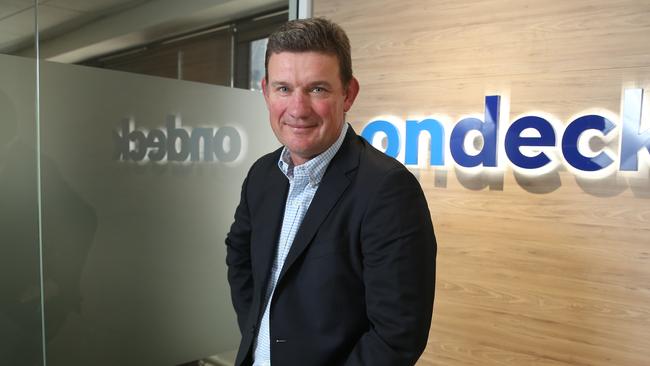Small and medium business riding out higher rates, inflation storm: OnDeck
SMEs are so far weathering sharp rate rises and price pressures well, with demand for credit staying robust despite concerns about the demand outlook, says fintech OnDeck.

Business
Don't miss out on the headlines from Business. Followed categories will be added to My News.
Small and medium businesses are weathering sharp rate rises and price pressures well, with demand for credit staying robust despite concerns about the outlook for consumer demand.
That’s the view of online business lender OnDeck’s Australia chief Cameron Poolman who also said applications for unsecured loans were stronger-than-anticipated in July, albeit with some pockets of weakness.
“From an application point of view it‘s been very strong the last few months, and last month was very strong in terms of small businesses applying for credit,” he added. “What we have seen is possibly some segments with more difficulties than others, particularly those where inflation has impacted and so has supply chain.”
OnDeck Australia board member Nick Brown – who is based in the US – noted businesses here were faring better than in several global markets where demand was starting to be impacted by rampant inflation and subsequent rate hikes.
“Demand is starting to soften in the US and some other markets that have perhaps been a little bit more affected by some of these structural problems,” he said. “There are a lot of places that are worse off right now than Australia in terms of demand as well as credit performance.”
OnDeck’s loan application volumes climbed by 43 per cent in the first half of 2022, compared to the same period last year. The non-bank lender doesn’t disclose the size of its Australian loan book.
The bumper volumes being seen at OnDeck are also reflected in the fourth-quarter results of ASX-listed business lender Prospa, which told investors quarterly loan originations were up 35 per cent on the same period a year earlier.
Mr Poolman said OnDeck was experiencing “strong conversions” of applications into loan approvals.
The Reserve Bank this month raised rates a fourth time for 2022 to 1.85 per cent as it attempts to cool inflation. While the RBA’s quarterly monetary statement last week highlighted a strong environment for business lending, it cautioned banks were expecting varied levels of future activity.
“Growth of business lending has increased to the fastest pace in more than a decade,” the RBA said. “Views on the outlook for business lending are mixed. Some banks expect lending growth to remain strong over the year, particularly for medium-sized and large firms, supported by strong economic conditions, the lagged effect on debt of high levels of (merger and acquisition) activity over the past 12 months and growth in business investment.
Mr Brown admitted there was a risk business credit demand would slow, although OnDeck could navigate that scenario given its longstanding funding lines and ability to cut expenses.
“We don’t know when, or if, that (demand softening) will happen in the Australian market,” he said. “But because of the way we have built our business model, even if we do see a softening of demand, we have ways of controlling expenses and ensuring that our customers continue to get the capital they need.”

The need to amass scale has proven key in other parts of the lending market.
The smaller end of the digital banking market has already rationalised – Volt has closed and 86 400 and Up were acquired. But those sorts of pressures were unlikely to spill into the non-bank business lending space, Mr Poolman said. There was “more specialisation” occurring and the market was evolving, but he didn’t expect a round of meaningful consolidation or a shake-out of players in the near term given they had navigated Covid-19 pandemic challenges, he added.
Still, OnDeck Australia is not yet profitable on an earnings before interest, tax, deprecation and amortisation measure.
“When you‘re growing fast, it’s very difficult to be profitable on … a P&L (profit and loss) basis, but on a cash flow basis, we are definitely profitable,” Mr Poolman said. “We could become very profitable, if we just decided to slow the growth.”
The major banks have also ramped up their presence in the unsecured business lending sector, where assets are not required to secure a loan, particularly as the pandemic disrupted many sectors and supply chain issues caused a rethink of inventory management.
Mr Brown – whose career has included an almost five-year stint at Commonwealth Bank and a number of roles at Discover Financial Services – said large banks were still hamstrung by legacy systems. “Companies that have built up their capabilities in the last 10 years they‘ve got a head start, because they haven’t had to be burdened by those old archaic legacy systems,” he said.
OnDeck charges annual interest rates that range between 10 per cent and 20 per cent, and its marketing focuses on loans of up to $150,000, with funding available in some cases in as little as two hours. Its website says larger loans can be turned around as quickly as one business day.
OnDeck has appointed technologist and former Tricolor Holdings and Discover operative Todd Estep to the role of head of data and analytics.
Locally, OnDeck has bedded down a buyout that saw 58 per cent of the firm acquired by the core Australian management group. Some 20 per cent is held by US-based OnDeck Capital, a wholly owned division of Enova, and about 22 per cent is owned by existing Australian investors.
National Australia Bank, the nation’s largest business lender, will provide some commentary on the health of the sector on Tuesday via its quarter update.
Originally published as Small and medium business riding out higher rates, inflation storm: OnDeck



